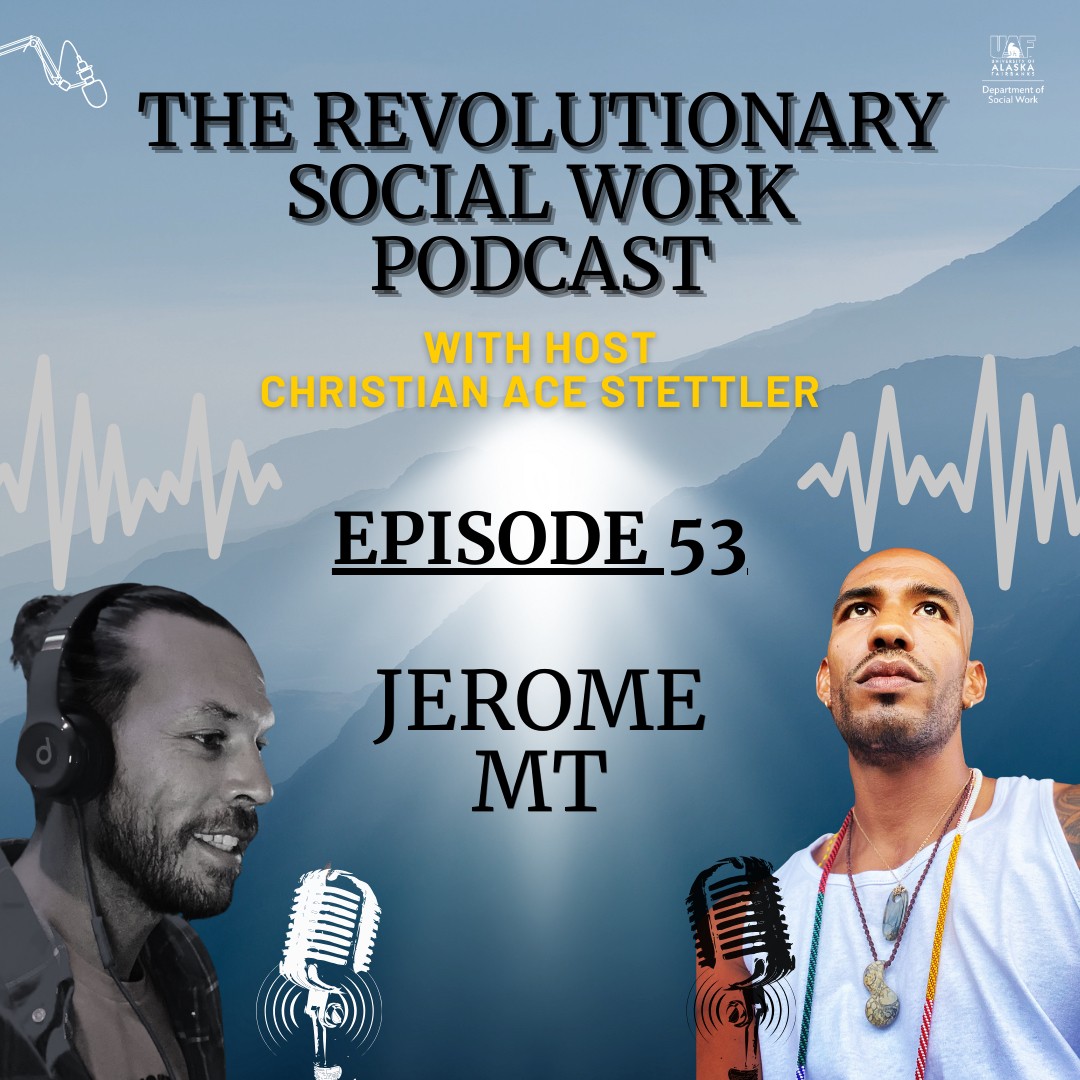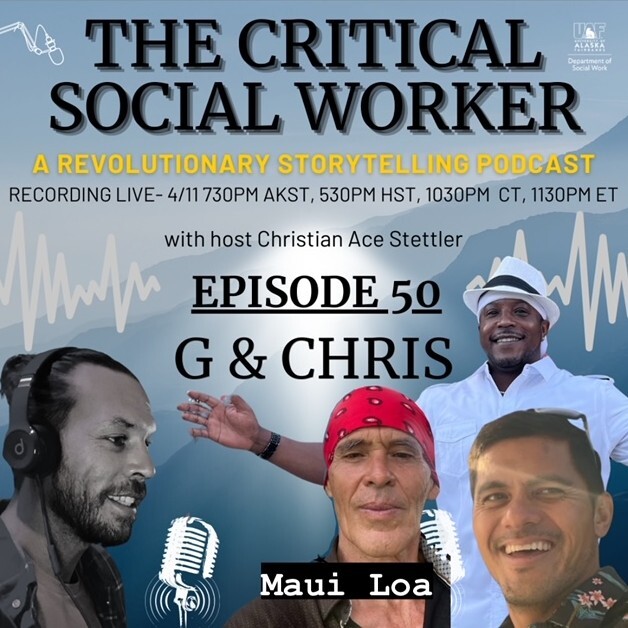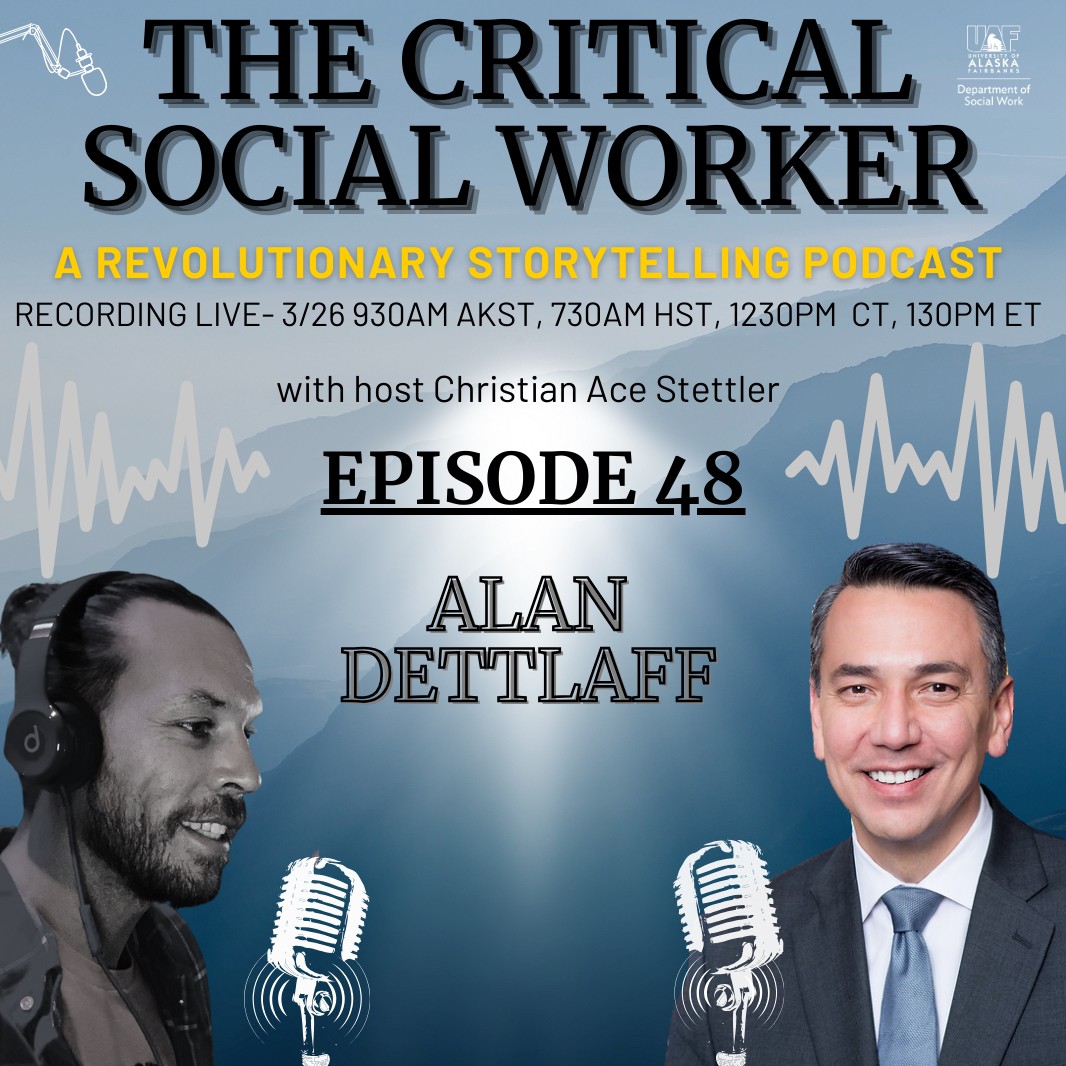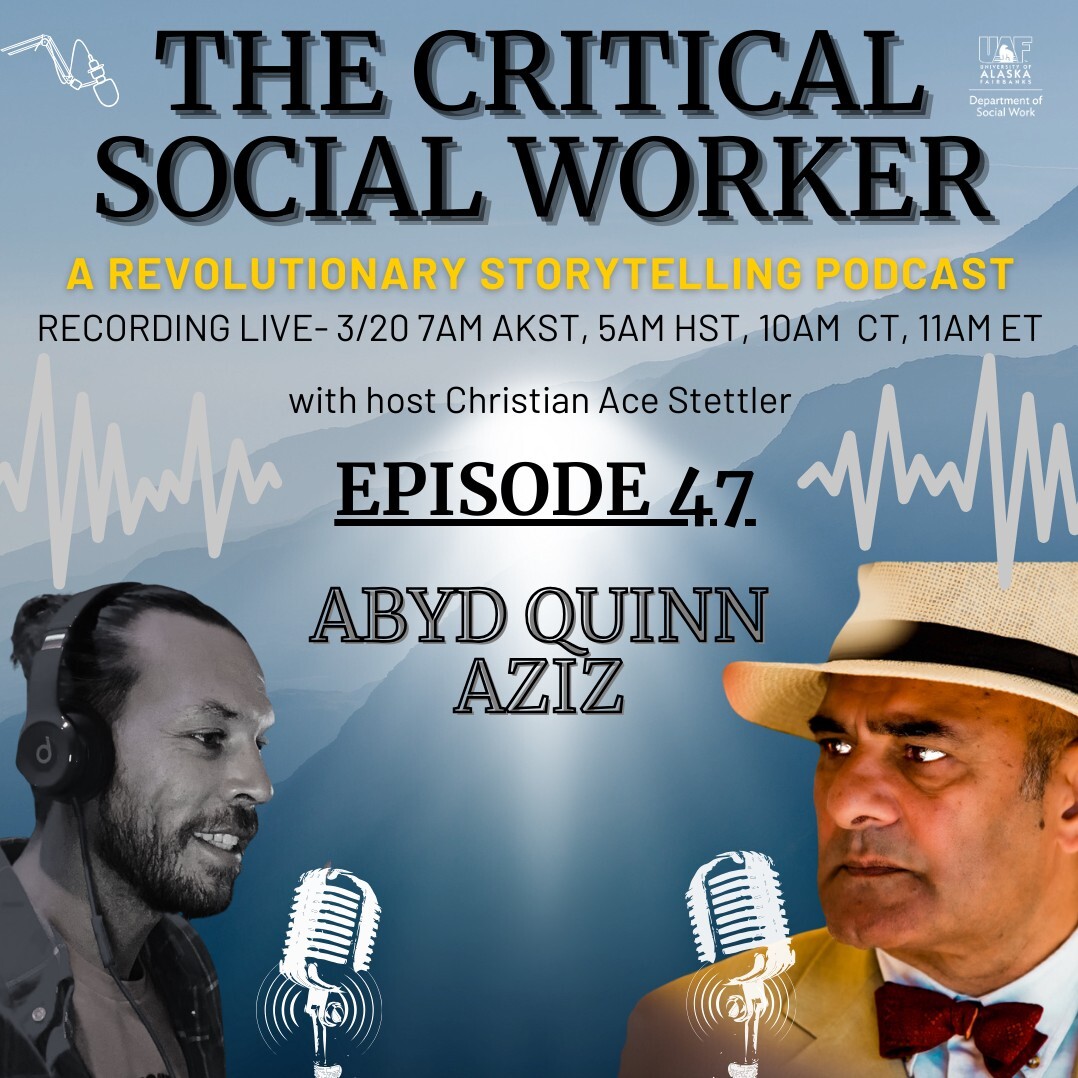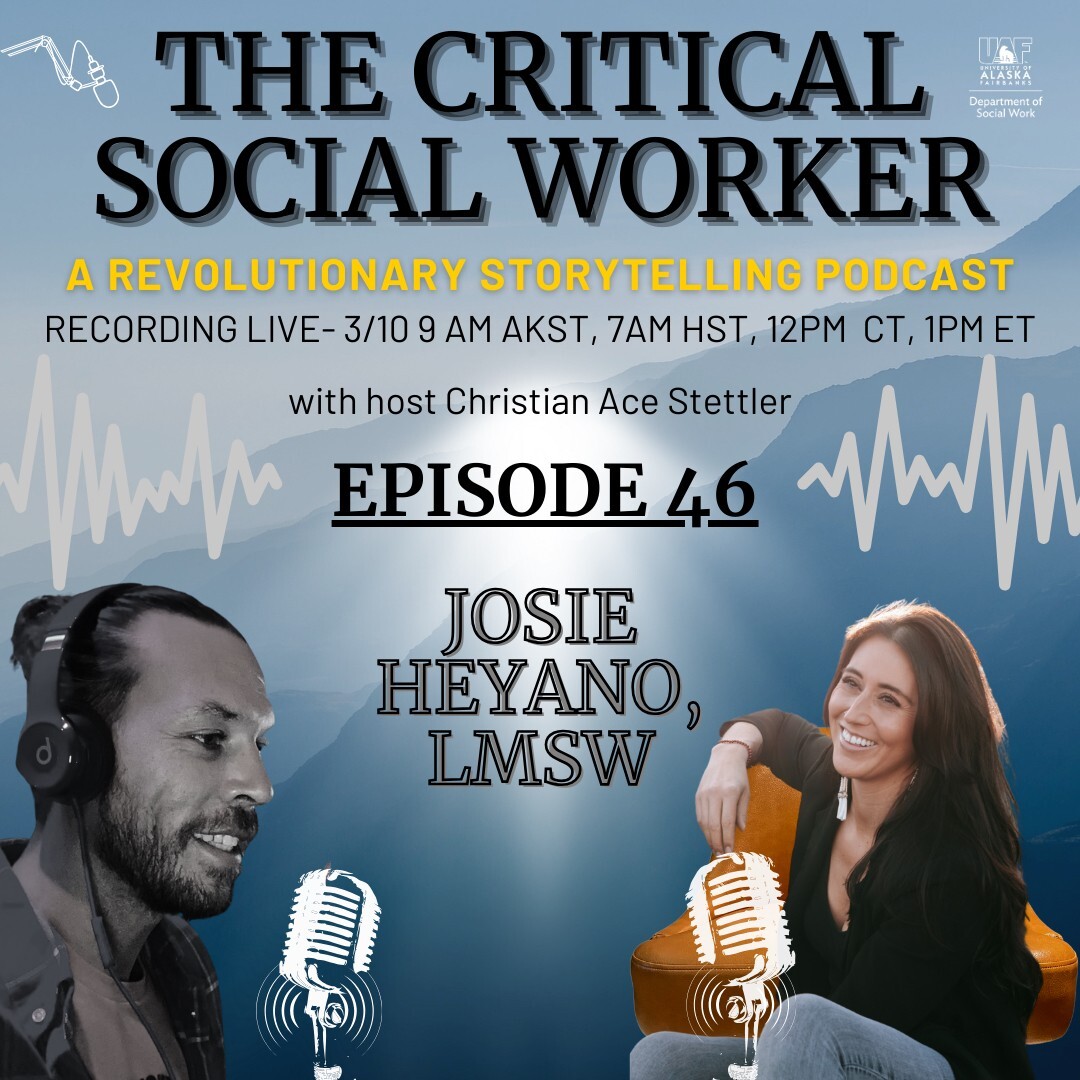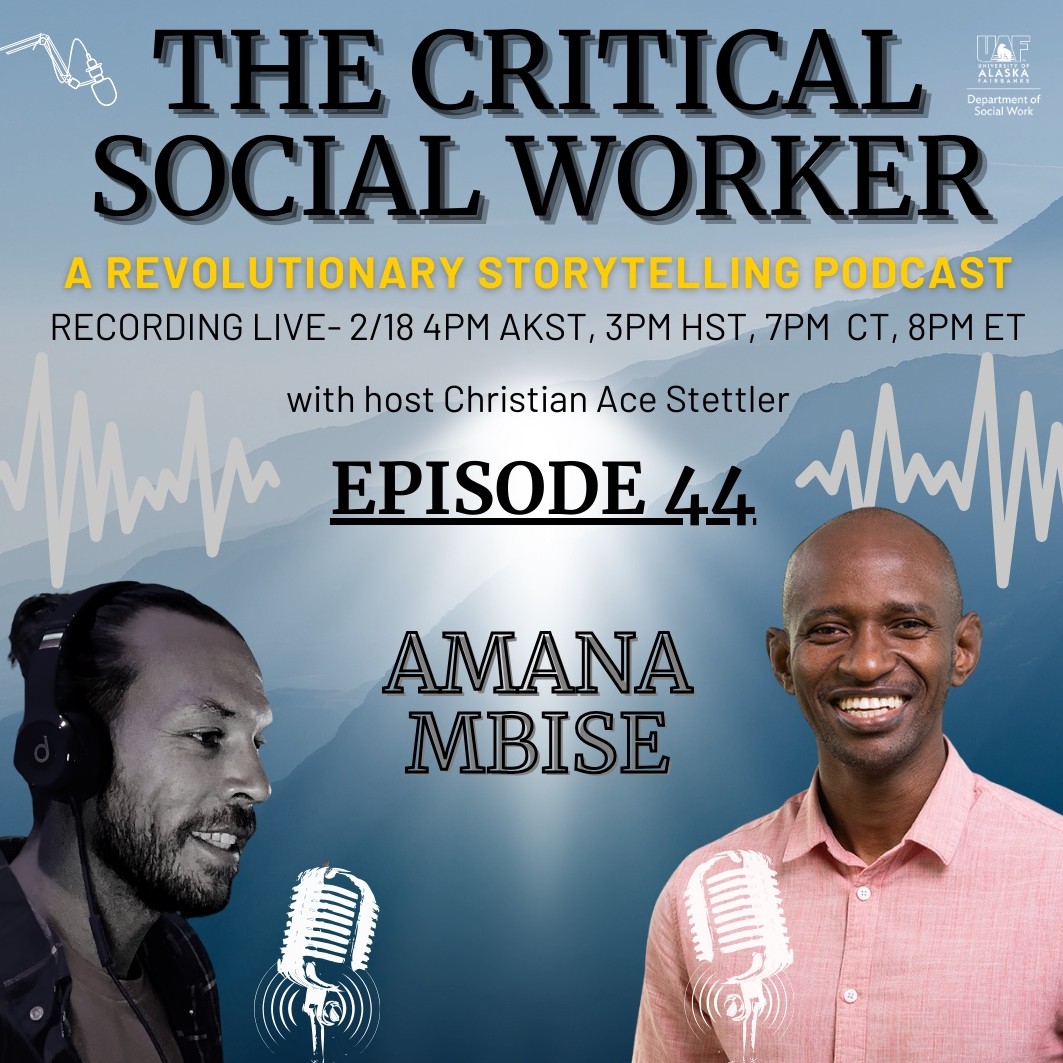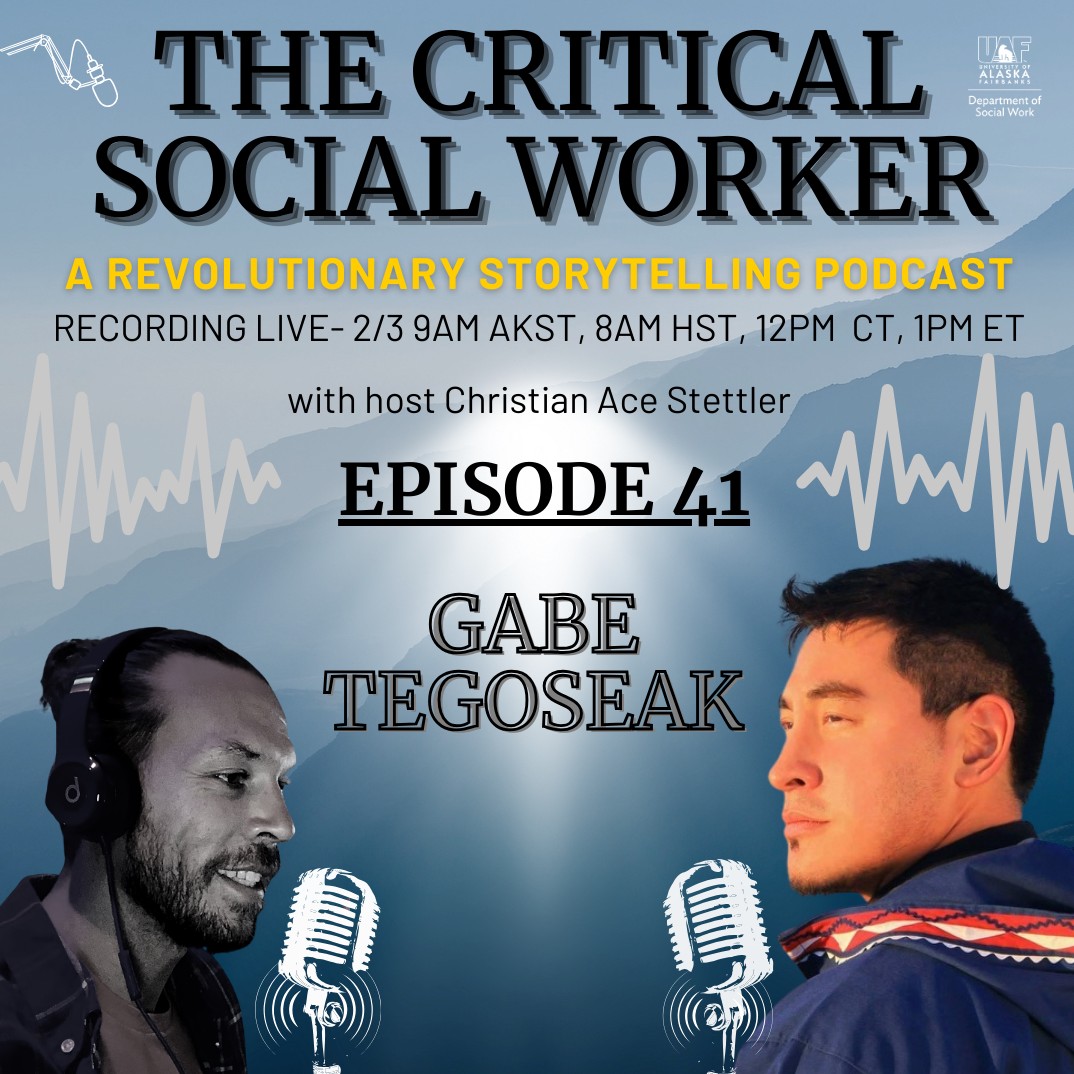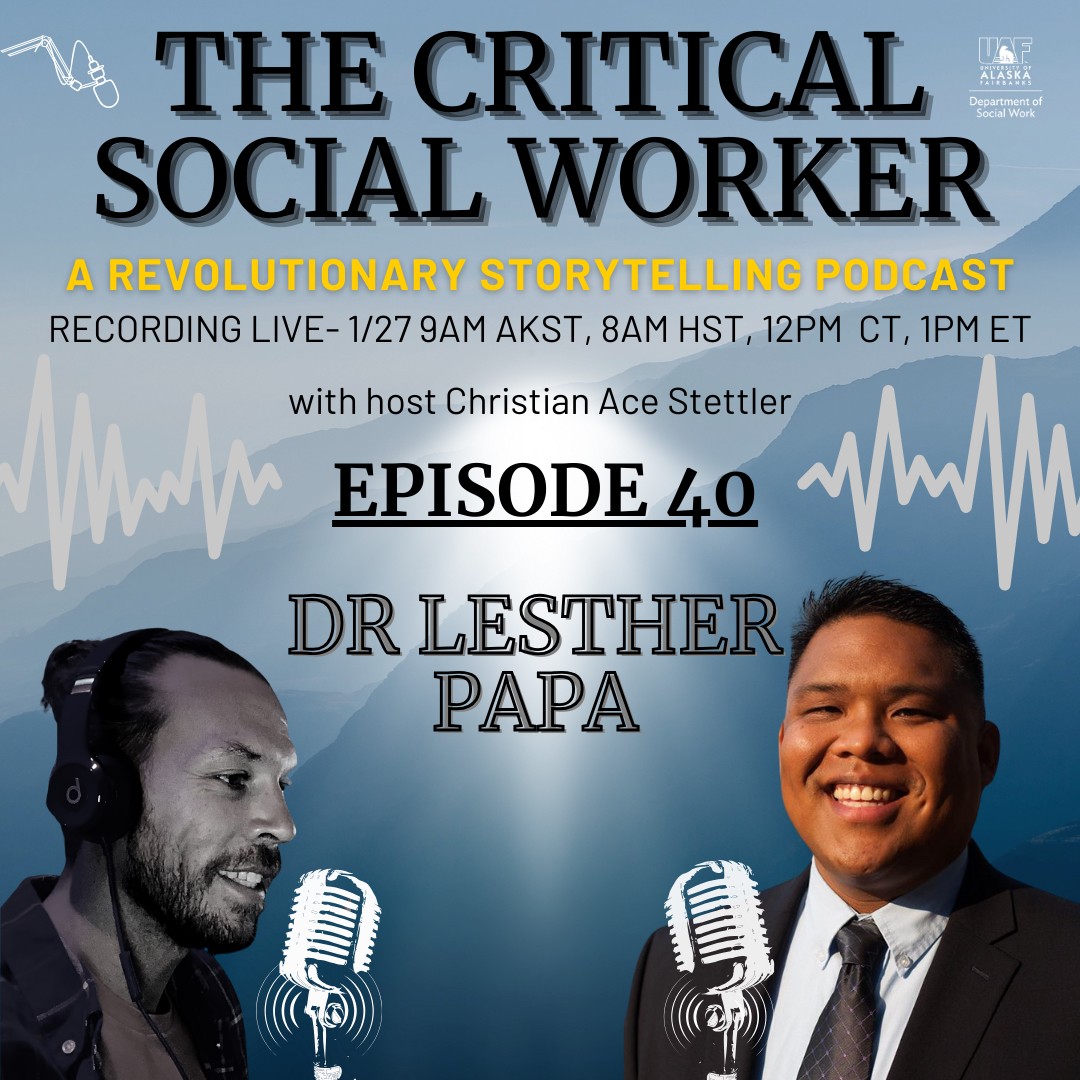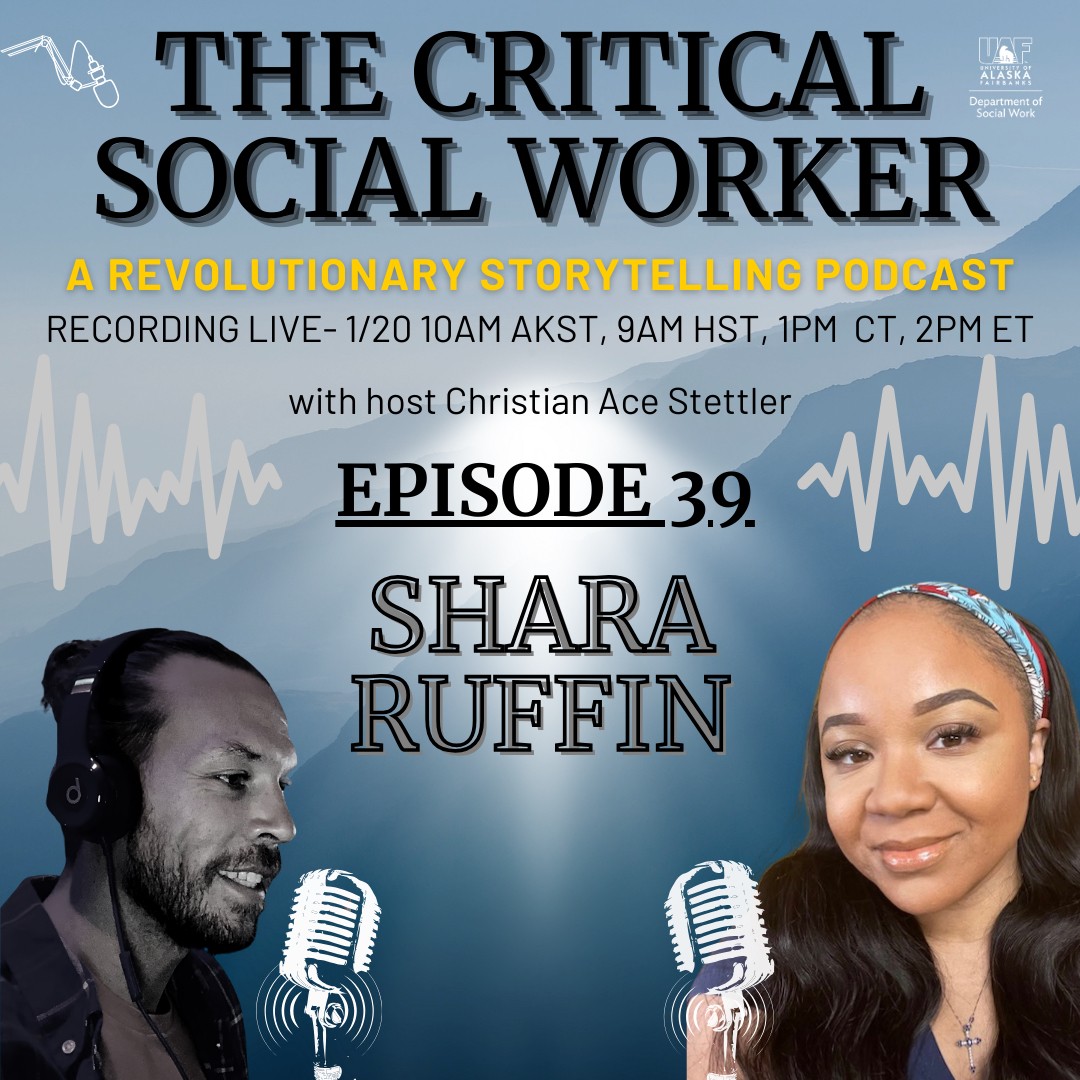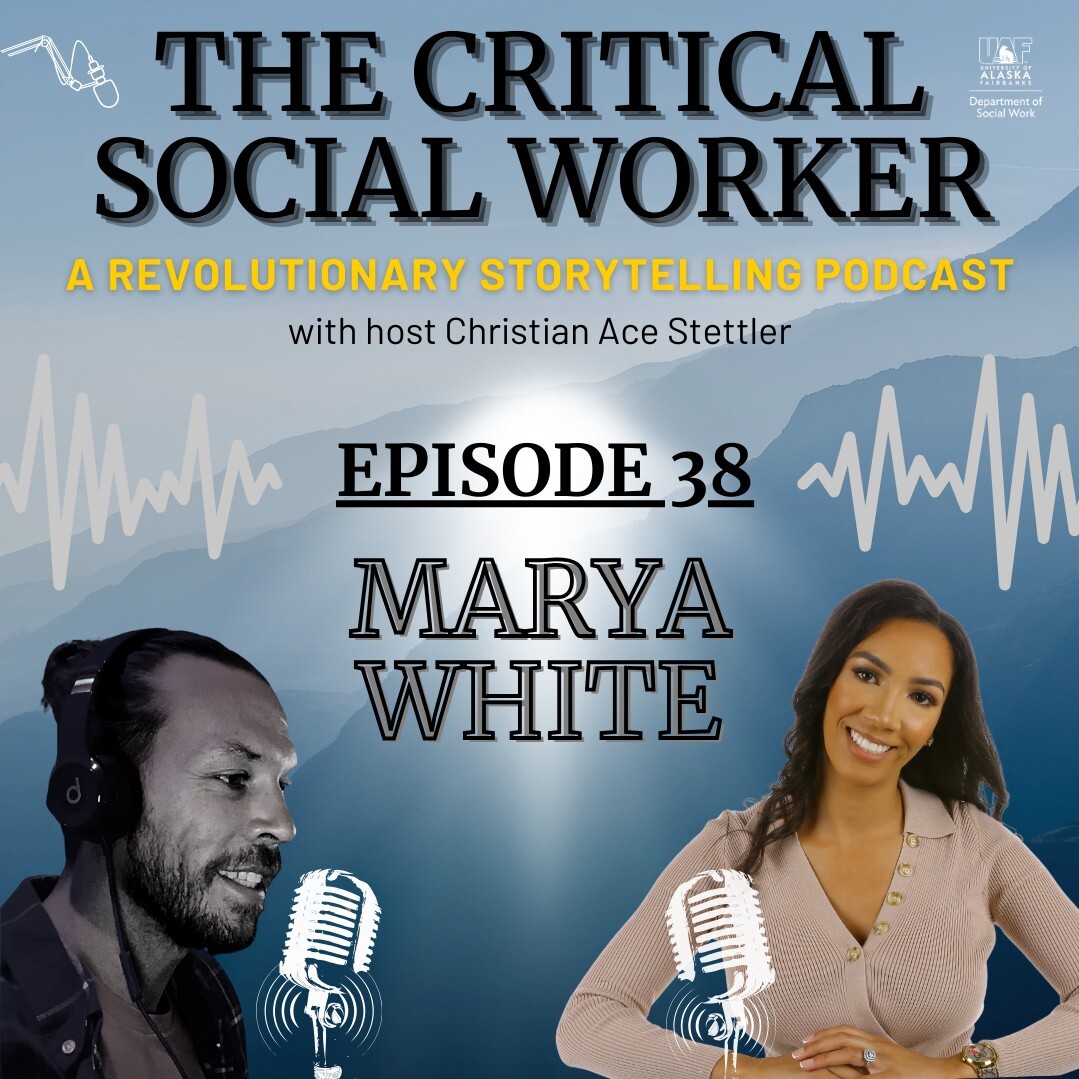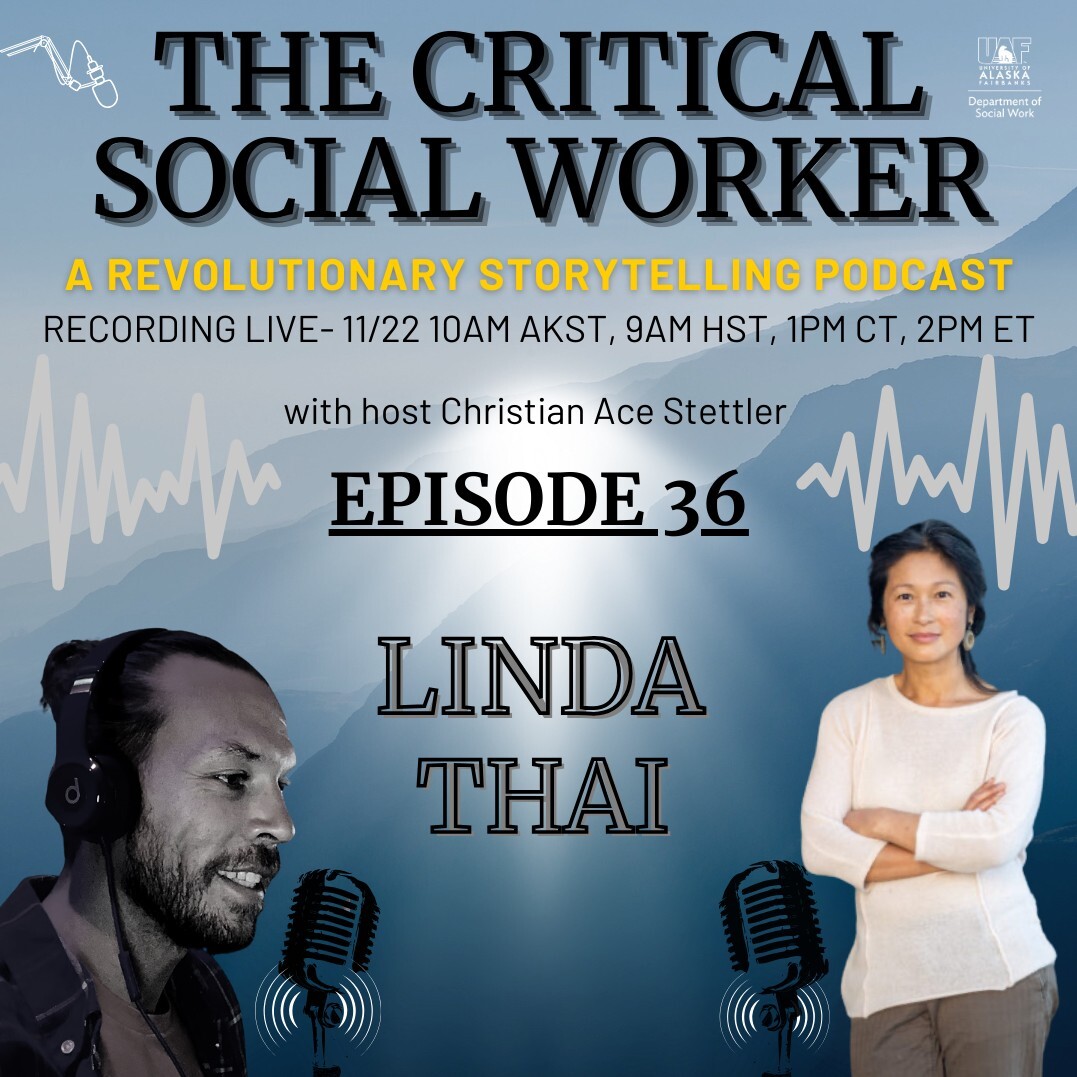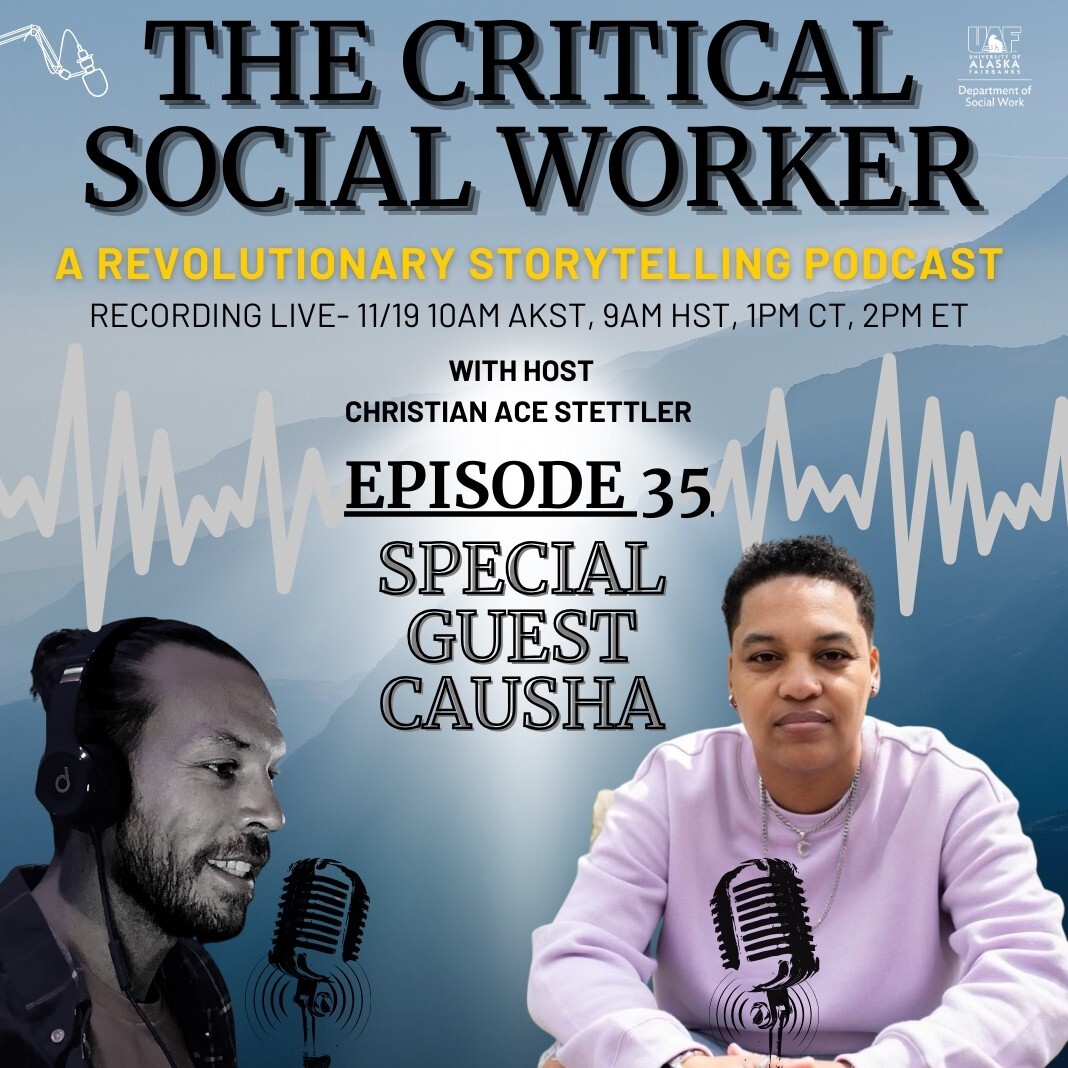Discover The Critical Social Worker: A Revolutionary Storytelling Podcast
The Critical Social Worker: A Revolutionary Storytelling Podcast

The Critical Social Worker: A Revolutionary Storytelling Podcast
Author: Christian Ace Stettler
Subscribed: 1Played: 2Subscribe
Share
© Copyright 2023 All rights reserved.
Description
Welcome to a journey of revolutionary storytelling with Christian Ace Stettler. Dive into unique stories and diverse perspectives to foster critical dialogue, empathy, and understanding. Through storytelling grounded in social work values, we aim to challenge the status quo, ignite transformation, and build a community of change-makers. Join us in exploring social work, justice, and what it means to be truly revolutionary.
51 Episodes
Reverse
Welcome to another inspiring episode of The Revolutionary Social Work Podcast. Host Christian Ace Stettler chats with Jerome MT, a Movement and Healing Artist who shares his unique insights on Practical Spirituality. Despite some audio issues, this episode is filled with valuable discussions on spirituality, community, and personal growth.
In This Episode:
Transitioning from Hawaii and finding new community connections
The grounding effects of connecting with land and nature
Navigating challenges with spirituality and heart wisdom
Expressing authenticity through movement and building community
The healing power of dialogue, empathy, and consistent practice
Chapters:
00:00 - Introduction to the episode
05:30 - Theme Song
06:15 - Leaving Hawaii
11:37 - Connecting with the Land and Nature
18:00 - Spirituality and Heart Wisdom
25:33 - Setting Boundaries and Practicing Reciprocity
32:49 - The Power of Mindset and Heartset
40:15 - The Role of Movement in Connecting with Nature
47:30 - Creating Community through Passion and Impact
55:45 - The Hierarchy of Community and Purpose
1:03:00 - The Power of Open-Heartedness
1:10:20 - Balancing Giving and Receiving
1:17:40 - The Role of Technology in Fostering Community
1:24:55 - The Healing Potential of Dialogue and Listening
1:32:10 - Transforming Trauma through Consistent Practice
1:39:35 - Creating Opportunities for Dialogue and Empathy
1:46:50 - Understanding and Processing Emotions for Personal Growth
1:54:05 - The Importance of Human Connection and Community Engagement
2:01:20 - Gratitude and Connection
2:08:35 - Dialogue and Human Connection in Clinical Social Work
2:15:50 - Respecting the Intelligence and Humanity of Individuals
2:23:05 - Self-Revolution and Personal Growth for Societal Change
2:30:20 - Masculinity, Fatherhood, and Authentic Existence
About Jerome MT: Jerome MT specializes in Somatic Awareness and Expression through dance and movement meditation. His Practical Spirituality philosophy empowers individuals by blending culture, religion, and intuition to foster self-acceptance and high-vibrational living. Find more about Jerome here: https://linktr.ee/LYTLVG
Tune in to explore these deep insights and enrich your personal and community journey.
It is my pleasure to (re)introduce you to Ms. Kiva Harper. This episode dives deep into the world of trauma and recovery, offering valuable insights for anyone passionate about social work, mental health, and community healing. Let's continue to learn, grow, and revolutionize our approaches to social work. Listen, reflect, and join the conversation!
Episode Highlights:
Introduction and Technical Difficulties (0:00 - 3:30)
Kiva Harper's Journey as a Clinical Social Worker (3:30 - 6:12)
The Role of Social Workers in Political Discourse (6:12 - 14:00)
The Importance of Social Work Education (14:00 - 28:35)
Decolonizing Education and Syllabi (28:35 - 40:06)
The Role of Artificial Intelligence in Education (40:06 - 43:10)
The Barriers of Hierarchy in Academia (43:10 - 52:28)
The Role of HBCUs and Hispanic Serving Institutions in Decolonized Education (52:28 - 58:59)
Challenging Privilege and Dismantling Systems of Oppression (58:59 - 1:11:11)
Additional Questions and Closing (1:11:11 - 1:20:03)
Outro (1:20:03 - 1:21:13)
Meet Kiva Harper: A Licensed Clinical Social Worker (LCSW) specializing in trauma-focused psychotherapy for more than two decades, Kiva Harper has emerged as one of the nation's foremost thought leaders in trauma treatment. Harper now speaks and consults extensively, is a frequent mental health correspondent for network TV & radio, a contributing writer to industry trades, and a social media influencer. You can join her VIP list here.
Key Quotes from the Episode:
"Trauma is definitely stored in our bodies."
"Anyone impacted by a mass shooting needs access to counseling and therapy."
"Validate the experiences of clients who have had negative experiences with law enforcement."
"How can we make or go back to having transformative education for our students?"
"We're so focused on grades. I gotta get an A, I gotta get an A. When is this due, when is, you know, and they miss the process."
Listen, learn, and let's revolutionize our approach to social work together.
#SocialWork #MentalHealth #CommunityHealing #RevolutionarySocialWork #Trauma
Episode 51: Charting a New Path | Dissenting Social Work with Dr. Paul Michael Garrett
In this thought-provoking episode of The Critical Social Worker: A Revolutionary Storytelling Podcast, Christian Ace engages in a profound conversation with Dr. Paul Michael Garrett about dissent and decolonization in social work. Recorded live from the heart of social work education in Galway, Ireland, the episode delves into critical themes shaping the future of the profession.
Episode Highlights:
Introduction and Background (0:00 - 3:42)
Challenges and Critiques of Social Work (3:42 - 19:10)
Collective Action and Solidarity in Dissenting Social Work (19:10 - 30:05)
Listening to Diverse Experiences in Social Work Education (30:05 - 35:51)
Building Trust and Abolitionist Approaches in Social Work (35:51 - 54:06)
Critical Activism and Progressive Responses in Social Work (54:06 - 1:00:15)
Meet Dr. Paul Michael Garrett: Dr. Paul Michael Garrett, a renowned social work educator and writer, brings his extensive expertise to the discussion, shedding light on the challenges and importance of dissent in a profession often at risk of falling into compliance. With a keen focus on decolonization, Dr. Garrett emphasizes the need to stretch reading lists, critically analyze canonical figures, and listen to the diverse experiences of students to promote dissenting social work.
Key Quotes from the Episode:
"Social workers want to help people, but we often end up...working as a cog within the system."
"The notion that social work would end is...highly unlikely given the investments that states make in the profession."
"Dissenting social work combats white supremacy and racism and is alert to the dangers of fascism."
"How can we as professors kind of incorporate that into our curriculum and in the way that we work with students?"
"Social work education should at least have the opportunities for social work students to become more fully human, to build critical consciousness, and to grow as a human being."
"We're living within a profession in kind of difficult times. And more broadly, in terms of the big picture, we've got challenging and difficult times."
Listen, learn, and let's revolutionize our approach to social work together.
Book Link: Dissenting Social Work
Article Link: Critical Social Work Article
#SocialWork #Dissent #Decolonization #RevolutionarySocialWork #SocialJustice
In the 50th episode of The Critical Social Worker: A Revolutionary Storytelling Podcast, host Christian Ace Stettler is joined by guests G Ford and Chris Flores for an insightful conversation recorded live at the Kaimana Beach Hotel in Honolulu, Hawaii. In a serendipitous encounter, Hawaiian Elder Maui Loa joins the dialogue, adding a wealth of wisdom and cultural insights.
Episode Highlights:
Introduction and Background (0:00 - 5:35)
G's Work in Dialysis (5:35 - 11:02)
Managing Personal Challenges in Social Work (11:02 - 16:21)
Building Trust in Indigenous Areas (16:21 - 24:57)
The Need for Social Change (24:57 - 42:22)
Respecting Artists: Maintaining Dignity and Appreciation (42:22 - 56:36)
Gathering on the Land: Community and Connection (56:36 - 1:12:17)
Addressing Wealth Inequality and Social Change (1:12:17 - 1:25:30)
Gratitude and Well Wishes (1:25:30 - 1:40:32)
Meet G Ford and Chris Flores: G Ford, who works in dialysis, and Chris Flores, a specialist in forensic case management, share their powerful stories of making a significant impact in their clients' lives. They emphasize the importance of listening, respect, and humor in their challenging fields, highlighting the importance of self-care. Their insights are further enriched by Hawaiian Elder Maui Loa's cultural knowledge and perspectives.
Key Quotes from the Episode:
"I try to put humor in a lot of things. If people smile when they laugh, it really just softens the impact of whatever is going on at that time."
"How do we gain the trust of people, especially when you're in indigenous areas?"
"Social work chose me. Like I never intended to go, I never like looked at myself that way or intended to go that way."
"Don't mess with him when he's just doing his art. Give him his dignity."
"You know we need technology to reach the people, to enlighten the people."
Summary: In this episode, Christian Ace, G Ford, and Chris Flores discuss their experiences in social work, focusing on dialysis and forensic case management. They share personal stories and strategies for building trust and respect, especially in Indigenous communities. The conversation also explores broader social implications, including the challenges posed by restrictions on street art sales and the balance between technology and nature. Hawaiian Elder Maui Loa's contributions add depth, emphasizing connection, mindfulness, and the importance of social change.
Join us for an engaging and transformative conversation that highlights the power of storytelling and the importance of empathy, understanding, and unity in our communities.
Listen, learn, and let's revolutionize social work together.
#SocialWork #IndigenousCommunities #SocialChange #Mindfulness #Education #Technology #Art #SelfCare
In this compelling episode of The Critical Social Worker: A Revolutionary Storytelling Podcast, host Christian Ace Stettler engages in a transformative conversation with Alicia Stettler, LCSW, about revolutionary social work and the power of dialogue in fostering unity and understanding. Recorded live in Hawaii, this episode delves into the critical themes shaping the future of social work and the importance of speaking up against injustice.
Chapters:
00:00:04 - Introduction and Episode Context
00:01:10 - Alicia’s Background and Journey
00:02:29 - Integrating Yoga and Social Work
00:04:18 - Returning to Hawaii
00:06:24 - Clinical Social Work Journey
00:10:33 - Learning from Mentor Mo
00:14:41 - Recognizing Trauma and Narcissism
00:18:46 - Healing Power of the Ocean
00:21:07 - Call from Sharla
00:30:00 - Technical Difficulties
00:31:00 - Conflict and Intervention
00:36:55 - Police and Local Conflicts
00:41:21 - Palestine Conflict and Social Work Responsibility
00:52:37 - Race, Identity, and Unity
01:06:43 - Empowering the Oppressed and Community Healing
01:12:13 - Navigating Systemic Challenges and Optimism for the Future
Meet Alicia Stettler: Alicia Stettler, LCSW, originally from the U.K. with roots in Jamaica and Hawaii, brings a unique perspective to the discussion as a co-founder of A Conscious Party and the conceptualizer of Revolutionary Yoga. As a full-time mother and clinician for SEARHC in Alaska, she emphasizes the importance of regulating one's energy when working with clients who have experienced trauma.
Listen, learn, and let's revolutionize our approach to social work together.
#SocialWork #RevolutionarySocialWork #Unity #Dialogue #Empathy #YogaTherapy #SocialJustice
In this compelling episode of The Critical Social Worker: A Revolutionary Storytelling Podcast, host Christian Ace Stettler engages in a transformative conversation with Dr. Alan Dettlaff, a prominent figure in the abolitionist movement within social work. Dr. Dettlaff shares profound insights into the challenges and aspirations of this transformative approach.
Episode Highlights:
Introduction and Background (0:00)
The UpEnd Movement (5:00)
Can Social Work be Abolitionist? (10:15)
The Shift in the Abolition Movement (15:25)
The Challenges of Social Work (20:50)
The Role of Higher Education (22:09)
The Future of Social Work (25:06)
Challenges in Social Work Education (27:31)
Removal as Dean (38:11)
Concerns about Cop City (32:30)
Israel-Palestine Conflict (44:59)
Faculty Opposition (40:37)
Responsibility to Talk About Palestine (44:52)
Silencing and Challenging the System (47:43)
Provocation and Pushback (50:01)
Personal Experience and Questions (56:24)
Preparing for a Future in Social Work (1:06:56)
Supporting Parents in the Child Welfare System (1:08:25)
The Harmful Effects of the Child Welfare System (1:12:01)
The Power Imbalance in Child Welfare (1:16:05)
Supporting Parents and Addressing Harm (1:20:43)
Imagining a Future Without Oppressive Systems (1:24:25)
Meet Dr. Alan Dettlaff: Dr. Alan Dettlaff, a leading advocate for the abolitionist movement in social work, brings his extensive expertise to the discussion. He introduces us to the UpEnd Movement, dedicated to dismantling the child welfare system as a mechanism of family policing that perpetuates inequality. Dr. Dettlaff eloquently articulates the broader abolitionist mission to dismantle oppressive systems, including prisons, policing, and the child welfare system, to pave the way for a more just and equitable society.
Listen, learn, and let's revolutionize our approach to social work together.
#SocialWork #AbolitionistSocialWork #Dissent #Decolonization #RevolutionarySocialWork #SocialJustice
In this transformative episode of The Critical Social Worker, host Christian Ace Stettler engages in a thought-provoking dialogue with Abyd Quinn Aziz, a Reader/Professor in Social Work at Cardiff University and a revolutionary force in the field.
Episode Highlights:
Introduction and Ramadan (0:00 - 5:00)
The Meaning of Ramadan (5:00 - 15:25)
Becoming a Registered Social Worker in the UK (15:25 - 23:07)
Differences in Social Work between Wales and the US (23:07 - 29:03)
Values and Funding in Social Work (29:03 - 34:50)
Introduction to Wales (34:50 - 36:09)
The Welsh Language (36:09 - 38:23)
Staying Updated in Social Work (38:23 - 40:55)
The Changing Landscape of COVID-19 (40:55 - 46:07)
The Origin of Social Work (46:07 - 52:04)
The Obligation of Social Workers in Worldly Conflicts (52:04 - 53:01)
The Need for Dialogue and Understanding in the Israel-Palestine Conflict (53:01 - 58:21)
The Influence of Money and Politics in World Conflicts (58:21 - 1:03:29)
The Need for Change in Political Leadership (1:03:29 - 1:09:05)
Speaking Out Against Funding Wars and Gun Manufacturing (1:09:05 - 1:09:52)
The Impact of Money and Spending (1:09:52 - 1:10:43)
The Role of Money in Islam (1:10:43 - 1:11:08)
Acts of Kindness and Charity (1:11:08 - 1:17:14)
Shared Humanity and Connection (1:17:14 - 1:18:25)
The Impact of Substance Abuse and Homelessness (1:18:25 - 1:20:32)
The Dilemma of Voting (1:20:32 - 1:21:17)
The Lesser of Two Evils (1:21:17 - 1:21:55)
Political Options in Wales (1:21:55 - 1:22:32)
The Importance of Speaking Out for Palestine (1:22:32 - 1:25:26)
Applying Indigenous Values to Anti-Semitism and the Conflict in Palestine (1:25:26 - 1:28:20)
Indigenous Cuisine and Cultural Sensitivity (1:28:20 - 1:33:04)
Ramadan and Eid Celebrations (1:33:04 - 1:36:27)
Cultural Sensitivity in Social Work (1:36:27 - 1:42:12)
Training for Cultural Sensitivity (1:42:12 - 1:44:08)
Meet Abyd Quinn Aziz: Abyd Quinn Aziz is a dedicated social work educator at Cardiff University. His journey from grassroots advocacy to academic leadership showcases his commitment to challenging the status quo in social work.
Key Topics Explored:
Ramadan and Social Justice: The significance of fasting and self-reflection during Ramadan.
Cultural Sensitivity: Challenges in providing culturally sensitive social work services.
Expanding Social Work: Embracing community-based initiatives and adopting an abolitionist framework.
Anti-Racism and Decolonization: Confronting systemic injustices and imagining a just and inclusive society.
Takeaways:
Importance of fasting and self-reflection during Ramadan.
Navigating cultural sensitivities in social work.
Community and social justice in Welsh social work.
Anti-racism and decolonization in social work practice.
The transformative power of dialogue, empathy, and collective action.
Join us in honoring the revolutionary work of Abyd Quinn Aziz. Let's challenge the norms, dismantle oppressive systems, and pave the way for a just and equitable future in social work and beyond.
#SocialWork #Ramadan #SocialJustice #AntiRacism #Decolonization #RevolutionarySocialWork #CommunityEngagement #Equity #CollectiveAction #Podcast #AbydQuinnAziz
In this powerful episode of The Critical Social Worker, host Christian Ace Stettler engages in a transformative conversation with Josie Heyano, a Deg Xinag Athabascan woman from Alaska, and a revolutionary social worker.
Highlights:
Colonial Legacies and Decolonizing Service: Josie shares her insights and experiences in decolonizing practices within service organizations to better serve Alaska Native and Indigenous people. The conversation looks deep into the challenges of navigating colonial legacies and the imperative of centering Indigenous voices in social work practice.
Intersections of MMIP and Human Trafficking: Josie sheds light on the intersections of Missing and Murdered Indigenous Peoples (MMIP) and human trafficking, emphasizing the urgent need for regionally-specific prevention programs and community collaboration to address these pressing issues.
Commitment to Transformative Change: Throughout the dialogue, Josie's unwavering commitment to transformative change and advocacy for marginalized communities shines brightly. Her dedication to reshaping the social work landscape exemplifies the essence of revolutionary social work.
Audience Engagement and Contributions: The episode is enriched by active audience participation, fostering a dynamic and inclusive dialogue. Viewers actively contribute to the conversation, offering insights and reflections that deepen our collective understanding of the issues at hand.
Empowerment Through Storytelling: Through personal anecdotes and professional experiences, Josie empowers listeners to embrace their role as agents of change and advocates for justice. Her narrative serves as a beacon of hope and inspiration for aspiring social workers and advocates alike.
In Episode 45 of The Critical Social Worker: A Revolutionary Storytelling Podcast host Christian Ace Stettler welcomes Dr. Benjamin Lukey, a professor of philosophy at the University of Hawaii at Manoa and a pivotal figure in the Philosophy for Children (P4C) Hawai‘i initiative. This engaging dialogue dives deep into the transformative power of curious inquiry and its significant impact on students, educators, and the educational system at large.
Listeners will gain insight into the development of students involved in P4C, noting their increased openness, appreciation for diverse perspectives, and enhanced collective thinking skills. The episode also addresses the challenges of sensitive topics in educational settings, the balance between empathy and accountability, and the creation of safe, supportive environments.
Throughout the episode, Christian and Dr. Lukey share personal anecdotes from their experiences with children, discussing the importance of movies, TV shows, and books in sparking philosophical conversations and fostering an environment ripe for dialogue. Dr. Lukey details his journey into dialogic education, emphasizing the crucial role of wonder, the beginner's mind, and the detailed process of implementing P4C in schools. The conversation covers the entire P4C inquiry process—from creating a focused community to reflection—highlighting the adaptability needed to cater to different community needs and readiness levels.
Listeners will gain insight into the development of students involved in P4C, noting their increased openness, appreciation for diverse perspectives, and enhanced collective thinking skills. The episode also addresses the challenges of sensitive topics in educational settings, the balance between empathy and accountability, and the creation of safe, supportive environments.
Furthermore, the discussion extends to the role of creative arts in education, the importance of inclusion in special education, and strategies for creating inclusive communication spaces. Christian and Dr. Lukey explore the balance between time and accountability, the tension between traditional schooling and talking circles, and the critical decision-making process regarding the best education options for children.
This episode is a must-watch for educators, parents, and anyone interested in the potential of philosophy to shape young minds and transform educational practices. It serves as a call to action for like-minded educators to collaborate, experiment, and embrace new approaches to education, ensuring a more inclusive, thoughtful, and impactful learning experience for all.
Tune in to The Power of Curious Inquiry | A Dialogue with Dr. Benjamin Lukey for a deep dive into the heart of philosophy for children and its pivotal role in shaping the future of education.
In another episode of The Critical Social Worker: A Revolutionary Storytelling Podcast, host Christian Ace Stettler had the pleasure of talking story with Dr. Amana Mbise, professor of social work at the University of Alaska Anchorage. They talked about a wealth of different revolutionary topics and enjoyed the robust participation from the audience.
Personal Journey:
Dr. Mbise's narrative began in Tanzania, through Chicago and then at the University of Dar es Salaam, tracing his impactful journey through Denmark, and back to the United States finally landing at the University of Alaska Anchorage. His story is a testament to the power of education and dedication in making a tangible difference in communities worldwide.
Global Health Initiatives:
Listeners gained insights into Dr. Mbise's significant contributions to global health, particularly in the fight against HIV/AIDS and malaria. His experiences have not only shaped his approach to health challenges but also underscored the importance of a unified global response.
Refugee Integration and Community Development:
The episode delved into Dr. Mbise's efforts in supporting refugee communities in both Tanzania and the U.S. He shared successful integration practices that foster community development and ensure that refugees can build new lives with dignity and respect.
Labor Exploitation and Human Trafficking:
A pressing segment of the conversation focused on Dr. Mbise's research into labor exploitation in Alaska and the battle against human trafficking in Tanzania. His work sheds light on these dark aspects of globalization and the critical need for vigilance and action.
The Black Experience in Alaska:
Dr. Mbise unveiled findings from the first health needs assessment of Black Alaskans, offering critical insights into the health status, needs, and strengths of this community, highlighting the unique challenges they face in a cold frontier. Social Work Education: The discussion also covered Dr. Mbise's teaching philosophy and methods, reflecting his vision for the future of social work education. He emphasized the importance of focusing on migration, human trafficking, and health equity to prepare students for the challenges of our time.
Language and Audience Engagement:
An unexpected yet enriching focus of the episode was the discussion on language from various perspectives, including its role in identity, communication barriers, and as a tool for integration. The live format fostered a high level of audience engagement, with listeners contributing through chat and call-ins, adding depth to the dialogue on social work's role in bridging communities and enhancing global health initiatives.
This episode was not just a narrative of Dr. Mbise's cross-continental journey but an exploration of the intricate issues at the intersection of migration, health, and social work. The lively interaction with the audience added a dynamic layer to the conversation, making it a memorable and insightful experience for all involved.
In the another episode of The Critical Social Worker: A Revolutionary Storytelling Podcast, host Christian Ace Stettler connected with Michon Whiterose, a LCSW deeply rooted in Ahtna Athabascan heritage, for a dialogue that spanned a wide array of topics central to wellness, storytelling, and the intricate dance of navigating life's challenges.
Here's a brief overview of the key takeaways and highlights from their discussion:
TikTok as a Storytelling Platform: Michon shared her insights on the emerging role of TikTok and digital media as powerful tools for storytelling, offering new ways to connect and share personal narratives.
Digital Storytelling and Healing: The conversation explored the significance of digital storytelling in healing and personal growth, highlighting its potential to reach wide audiences and create meaningful connections.
Personal Experiences and Parenting: Michon opened up about her personal journey, discussing how her experiences have shaped her parenting style and her mission to break generational cycles for a healthier family dynamic.
The Impact of Perfectionism: Discussing the often detrimental role of perfectionism in relationships and personal well-being, Michon emphasized the importance of embracing imperfection and learning from it.
Navigating Childhood Trauma: The dialogue delved into strategies for dealing with childhood trauma, underscoring the importance of self-care and seeking support when needed.
Self-Care in Indigenous Communities: Michon discussed the unique challenges and approaches to self-care within Indigenous communities, stressing the interconnectedness of community wellness and individual healing.
Reconnecting with Indigenous Values: Highlighting the power of Indigenous values in fostering a sense of belonging and identity, the conversation touched upon the transformative process of reconnecting with one's roots.
The Role of Autoethnographies: The importance of valuing storytelling and autoethnographies in higher education, particularly from Indigenous authors, was emphasized as a way to enrich academic discourse and understanding.
Challenges in Clinical Social Work: Michon reflected on the challenges of maintaining self-care while working in the demanding field of clinical social work, sharing insights on finding balance and safeguarding personal wellness.
Using Self-Disclosure in Therapy: The discussion covered the use of self-disclosure in therapeutic settings, exploring its potential to build trust and foster deeper connections between therapists and clients.
Creating New Traditions: Michon spoke about the importance of creating new traditions and connections with personal culture, weaving together the past and present to forge a path forward.
Empathy and Setting Boundaries: The conversation also addressed the challenges faced by empaths, including the need for setting boundaries and trusting oneself to protect personal energy and well-being.
Listening to Your Inner Voice: Michon stressed the significance of listening to one's inner voice and trusting personal feelings as guides to making healthier life choices. The Power of Podcasts:
Expressing gratitude for the platform, Michon and Christian discussed how podcasts serve as a valuable source of learning, inspiration, and connection.
Revolutionary Social Work: The episode concluded with a discussion on revolutionary social work, advocating for challenging the status quo and embracing personal growth as a catalyst for broader societal change.
In the latest episode of The Critical Social Worker: A Revolutionary Storytelling Podcast, host Christian Ace Stettler had the privilege of engaging in a profound conversation with Ilarion Merculieff, a revered Unangan Elder known for his dedication to advocating for Indigenous rights and environmental stewardship. Despite facing technical challenges, the episode unfolded as a deeply insightful dialogue, shedding light on the transformative power of heart wisdom and the significance of talking circles.
Episode Highlights:
Ilarion Merculieff's Background: Merculieff shared his unique upbringing on St. Paul Island, emphasizing the importance of his traditional Unangan education in shaping his worldview and approach to life.
Heart Wisdom vs. Mind Logic: A central theme of the conversation was the contrast between leading from the heart, as opposed to the mind, with Merculieff advocating for a heart-centered approach to addressing both personal and global challenges.
The Role of Talking Circles: Merculieff highlighted the effectiveness of talking circles in creating a space for empathy, understanding, and consensus-building, pointing to their potential in transforming societal and interpersonal dynamics.
Kinship with Nature: The dialogue touched on the deep connection between humans and the natural world, with Merculieff sharing personal anecdotes that underscored the interconnectedness of all life. T
echnology and Connectivity: Reflecting on the dual nature of technology as both a tool for connection and a potential barrier to deeper interpersonal relationships, the conversation explored the balance needed in leveraging technological advancements.
Listener Engagement: The episode encouraged listeners to reflect on their own relationships with nature and consider how Indigenous wisdom can inform and enrich their understanding of the world.
Despite the episode's abrupt ending due to technical difficulties, the warmth and depth of the conversation left listeners with much to ponder about the importance of heart wisdom, the power of talking circles, and the potential for transformative change when we embrace these ancient practices in our modern lives.
In another episode of The Critical Social Worker: A Revolutionary Storytelling Podcast, we had the privilege of diving into the life, work and thoughts of Gabriel Igaugaq Tegoseak, a figure who embodies the spirit of the Arctic through his dedication to environmentalism, activism, and the sustenance of traditional subsistence living. Born and raised in Utqiaġvik (formerly known as Barrow), Alaska, Gabe shared his profound connection to the land, his people's heritage, and the critical role of indigenous knowledge in environmental stewardship.
Through our dialogue, Gabe illuminated the importance of merging traditional Iñupiat values with modern scientific approaches to ensure the longevity and protection of the Arctic's unique ecosystem. His work with notable organizations, including the Alaska Federation of Natives, First Alaskan Institute, and the Siļaliņamiut - Arctic Just Transition Coalition, underscores a life dedicated to advocating for sustainable practices that honor the land and its people.
The episode took us on a journey through Gabe's personal experiences, from the challenges and beauty of living in one of the coldest parts of Alaska to the rich cultural practices that have sustained his community for generations. Gabe's story is a testament to the power of storytelling in fostering understanding and empathy, challenging us to critically reflect on our relationship with the environment and the importance of indigenous leadership in the fight against climate change.
As we concluded our conversation, it became clear that Gabe's activism is not just about safeguarding the Arctic but also about inspiring others to recognize the value of tradition, the urgency of environmental protection, and the potential for collective action to enact transformative change.
This episode is an invitation to all of us to engage in critical dialogue, rethink our environmental impact, and support indigenous-led efforts to preserve the natural world for future generations. Join us in reflecting on this powerful episode and consider how we, too, can contribute to a more empathetic, understanding, and sustainable world. Be part of the conversation and the solution. Be revolutionary.
Takeaways
Extreme weather conditions in Alaska can impact daily life and travel.
Indigenous cultures have a deep connection with the natural environment and view it as kin.
Balancing indigenous values with the Western worldview can be challenging but necessary for personal growth and cultural preservation.
Colonization has had a significant impact on indigenous cultures, and it is important to acknowledge and address the resulting challenges.
Moving forward requires education, understanding, and finding harmony between Western and indigenous cultures. Navigating identity and racism can be challenging, especially for individuals who straddle multiple cultures.
Self-affirmation and finding balance between different cultural influences can help in developing a strong sense of identity.
Indigenous traditions and language revival can provide healing and strength during difficult times.
Racial profiling is a reality that many people of color face, and it is important to address and challenge these biases.
Stereotypes and prejudices can create a burden for individuals to prove themselves and break free from societal expectations.
Adapting and rising above racism requires patience, resilience, and a commitment to being the bigger person. Creating openness and changing the environment can be achieved through emotions and how we treat ourselves and others.
Helping children stay connected with nature and the natural rhythms of life is important for their mental health and well-being. Gabe Tegoseak is recognized as a revolutionary social worker who challenges the status quo and works towards a more just world.
In a new episode of The Critical Social Worker: A Revolutionary Storytelling Podcast, our host Christian Ace Stettler welcomes Dr. Lesther Papa, an assistant professor of psychology at San José State University. Their conversation traverses Dr. Papa's multicultural background, his journey through academia, and his commitment to addressing microaggressions and fostering multicultural healing.
Microaggressions and Multicultural Insights: Dr. Papa takes us into the nuanced world of microaggressions, explaining their impact on marginalized communities. With personal anecdotes and professional insights, he underscores the importance of recognizing and addressing these subtle forms of discrimination. Dr. Papa emphasizes the role of storytelling in building empathy and understanding across diverse groups.
A Personal Journey to Psychology: From his roots in Kauai and experiences as the child of Filipino immigrants, Dr. Papa shares his path to psychology. His story highlights the challenges and triumphs he encountered, reflecting on the importance of education instilled by his parents and the pivotal moments that guided him toward his passion for psychology and mental health counseling.
Educational Aspirations and Professional Pathways: The conversation also touches on Dr. Papa's academic journey, from overcoming obstacles in higher education to pursuing his PhD. He discusses the significance of research, mentorship, and hands-on experience in shaping his career, offering advice to listeners on navigating their educational and professional endeavors.
Fostering Empathy and Connection: Dr. Papa's teaching philosophy and his approach to connecting with students are explored, showcasing his commitment to creating an inclusive and supportive learning environment. He shares strategies for engaging students and encouraging them to embrace their identities and experiences as strengths.
Reflections on Identity, Culture, and Social Work: Christian and Lesther reflect on the broader implications of their discussion for social work and multicultural understanding. They emphasize the importance of acknowledging and valuing individual differences while working towards collective solidarity and support.
Honoring Memories and Moving Forward: The episode concludes with a tribute to shared experiences and the individuals who have influenced their journeys. Lesther and Christian highlight the importance of carrying forward the lessons learned and the memories cherished, as they continue to advocate for change and understanding in their respective fields.
Episode 39 of The Critical Social Worker: A Revolutionary Storytelling Podcast: Healing Dialogues | Perspectives on Social Work and Healing with Shara Ruffin, LCSW
In this episode, host Christian Ace Stettler welcomed Shara Ruffin, LCSW, to share her insights into the realms of grief, personality disorders, anxiety, family trauma, and much more. Recorded live on Saturday, January 20th 2024, the episode went deep into critical dialogues about the transformative power of empathy, understanding, and storytelling in the field of social work.
Key Highlights:
Resilience and Adaptation: Despite technical difficulties at the start, the conversation flourished, illustrating the resilience and adaptability inherent in podcasting and, more broadly, in the practice of social work.
Expertise and Experience: Shara, with her rich background in clinical social work and psychotherapy, discussed her specializations, including compassion fatigue, military counseling, mindfulness meditation, ADHD, anxiety, and her role as a Board Certified Tele-mental Health Provider.
The Power of Storytelling: The episode emphasized the importance of storytelling, not only as a therapeutic tool but also as a means of fostering a deeper understanding of complex social and psychological issues.
Audience Engagement: Highlighting the interactive nature of the podcast, the audience actively participated through the chat box and call-ins, contributing to the dialogue and sharing personal experiences and questions.
Overcoming Challenges: Shara shared her personal journey, including the challenges she faced with ADHD and the strategies she employed to overcome them, offering hope and practical advice to listeners who might be facing similar struggles.
Professional Growth: The conversation touched upon the importance of good supervision in social work, the role of mentorship, and the need for cultural competence and self-awareness among practitioners.
Community and Empathy: The episode underscored the significance of building community, fostering connections, and cultivating empathy towards oneself and others, echoing the podcast's mission to change the world one story at a time.
In an insightful episode of The Critical Social Worker: A Revolutionary Storytelling Podcast, host Christian Ace Stettler engaged in a meaningful dialogue with Marya Wright, a clinical social worker and educator known for her revolutionary approach to child welfare and systemic reform. The discussion focused on the need for trust, understanding, and comprehensive change within the child welfare system, emphasizing the importance of empowering system-impacted families and addressing implicit biases.
Key Takeaways:
Building Trust in Child Welfare: The conversation underscored the deep-seated lack of trust that the black community holds towards the child welfare system, spotlighting the necessity for systemic change and a more empathetic, culturally informed approach to rebuilding this trust.
Addressing Implicit Bias: Marya and Christian discussed how implicit bias significantly affects decision-making in child welfare, leading to disparities that impact children and families. They highlighted the urgent need for awareness and corrective measures within the system.
Revolutionary Approach to Social Work: Marya shared her perspective on what it means to be a revolutionary social worker, advocating for relentless change and challenging the status quo in child welfare. Her approach involves empowering clients through knowledge, honesty, and mutual respect.
Culture and Community in Social Work: The importance of understanding and respecting various cultures and backgrounds in building a supportive community was a central theme. Marya emphasized the value of togetherness and cultural competence in effective social work practice.
Empowering System-Impacted Families: The episode highlighted Marya's commitment to empowering families affected by the child welfare system. She shared insights on collaboration, autonomy, choice, and navigating conflicts, all while maintaining honesty and striving for real, lasting change.
This episode provided listeners with a comprehensive view of the challenges and opportunities in child welfare, seen through the lens of a professional deeply committed to making a difference. Marya Wright's experiences and insights offer valuable lessons and inspiration for all seeking to make a positive impact in social work and beyond.
In an engaging episode of The Critical Social Worker: A Revolutionary Storytelling Podcast, host Christian Ace Stettler and student co-host Doris welcomed Vikki Reynolds for a deep dive into the interplay between activism and therapy. This conversation provided insightful reflections on how therapists and activists can work together towards social justice and understanding.
Key Takeaways:
Solidarity Ethics in Therapy: The discussion emphasized the importance of integrating solidarity ethics into therapy, creating a space that is inclusive and empowering while acknowledging the unique struggles of marginalized groups.
Political Violence and Torture: Vikki highlighted the critical role of therapists and activists in addressing political violence and torture, advocating for therapy as a form of political witnessing and a means to heal from and resist such traumas.
Enraged Grief and Right to Anger: The conversation explored the concepts of enraged grief and the legitimate right to anger in the face of systemic oppression, emphasizing the need for therapeutic practices to validate and channel these emotions constructively.
Addressing Racism and Bias: The need for ongoing education on oppression, bias, and the importance of cultural sensitivity in therapy and activism was a focal point, particularly in dismantling stereotypes and combating racism within social work.
Israel-Palestine and Indigenous Issues: The episode featured a nuanced discussion on complex international issues like the Israel-Palestine conflict and the broader theme of indigenous rights and territories, underscoring the importance of understanding and actively engaging in these areas as part of ethical dialogue and activism.
In a deeply insightful episode of The Critical Social Worker: A Revolutionary Storytelling Podcast, host Christian Ace Stettler had a profound conversation with Linda Thai, delving into themes of darkness and light, trauma, healing, and connection. Recorded on Wednesday, November 22nd, in the heart of an Alaskan winter, this episode illuminated various facets of human experience, resilience, and growth.
Key Takeaways:
Ebracing the Dark Night of the Soul: Linda Thai shared her thoughts on facing life's challenging phases, often termed as 'the dark night of the soul,' and the transformative lessons they bring. She emphasized the importance of acknowledging and navigating through these periods for personal growth and healing.
Connecting with Wildlife and Our Inner Animalism: The conversation explored our deep connection with nature and wildlife, underlining how embracing our inherent 'animalism' can lead to a more integrated and authentic self.
Finding Comfort in Alaska's Environment: Linda discussed the unique experience of living in Alaska, focusing on adapting to and finding comfort in its extreme climate and landscape, and how this influences one's sense of self and place.
A Relational Approach to Education and Social Work: Linda's perspective on integrating relational approaches in education and social work highlighted the importance of building secure, empathetic connections for effective teaching and healing practices.
Trauma and its Somatic Impact: The conversation delved into how trauma manifests in the body and affects our behavior and relationships. Linda's expertise in the somatics of trauma offered insights into developing healthy aggression, boundaries, and addressing annihilation energy.
Reconnecting with Ancestry and Stories: The significance of ancestral connections and the power of stories in understanding our past and shaping our present and future was a key part of the dialogue.
Gratitude and the Spirit of Thanksgiving: The episode concluded with a focus on gratitude, its role in healing, and the significance of embracing the present moment.
Christian reflected on the recent correspondence he received regarding his discussions on Israel/Palestine, expressing appreciation for the respectful and engaging conversations. He emphasized his commitment to continuing these discussions for broader understanding.
As the coldest day of the year at -20 degrees set the backdrop for this episode, the warmth of the conversation with Linda Thai offered listeners a sense of comfort, understanding, and inspiration. This episode is available for listening on various podcast platforms, inviting listeners to join in this journey of embracing life's challenges and finding strength in the dark and light moments alike.
In a compelling episode of The Critical Social Worker: A Revolutionary Storytelling Podcast, host Christian Ace Stettler and guest Causha delved into profound discussions about grief and healing in social work, the situation in Palestine, and transformative approaches in social justice. The episode, recorded on Sunday, November 19th, 2023, offered listeners a blend of personal insights, professional expertise, and deep reflections on critical social issues.
Key Takeaways:
Grief and Healing in Social Work: The episode opened with an exploration of the integral role of grief in social work. Causha shared profound insights on the necessity of acknowledging and processing grief, not only for social workers but also in the lives of those they serve. The discussion highlighted grief as both a personal and collective journey, significantly impacting the practice and ethos of social work.
The Palestine Situation: Stettler and Causha tackled the complex and sensitive issue of the ongoing conflict in Palestine. The conversation covered the social, political, and humanitarian facets of the crisis, reflecting on how these grave circumstances intersect with the core values and ethics of social work.
Revolutionizing Social Work Practices: Causha spoke passionately about innovative approaches to social work, emphasizing the importance of holistic well-being and equitable resource access. They argued for an evolution in social work practice to better address the diverse and changing needs of communities.
Personal Journey Towards Balance: The dialogue also ventured into Causha's personal journey, focusing on their commitment to health, well-being, and a deep-rooted connection with nature and community. This personal narrative shed light on how individual experiences can profoundly influence professional practices in social work and activism.
Embracing Diverse Perspectives: A significant aspect of the episode was the emphasis on incorporating a wide range of voices and experiences in social work. Causha's unique approach, grounded in social justice and healing-centered methods, provided an enlightening perspective on the necessity of inclusive and empathetic practices in the field.
This episode of "The Critical Social Worker: A Revolutionary Storytelling Podcast" was not just informative but also emotionally resonant, offering listeners a multifaceted understanding of current social work challenges, the impact of grief, and the importance of innovative thinking in the profession.
Listeners can access this and other episodes on various podcast platforms and stay connected with the series by following UAF Social Work on Facebook and @aconsciousparty on Instagram. The podcast continues to be a platform for deep understanding, empathy, and revolutionary change in the field of social work.
Title: Episode 34 Stories of Revolution: Unveiling the Struggle with Haki Kweli Shakur
Recorded on: Wednesday, November 15th, 2023, at 10 am Alaska Time
Host: Christian Ace Stettler, with student co-host David Shelton
In this profound and extended episode of The Critical Social Worker: A Revolutionary Storytelling Podcast, host Christian Ace Stettler and co-host David Shelton engaged in an in-depth conversation with Haki Kweli Shakur. This episode proved to be a deep dive into topics of revolutionary import, covering areas from the ongoing genocide in Gaza to the systemic issue of anti-Blackness within social work.
Episode Highlights:
Genocide in Gaza: The episode took a deep and critical look at the current situation in Gaza, exploring the complexities and human impact of the ongoing conflict. Haki's perspective provided a unique lens through which to understand the broader implications of this geopolitical crisis.
Anti-Blackness in Social Work: A critical discussion unfolded about the prevalence of anti-Blackness within the field of social work. The dialogue touched on how systemic racism shapes social work practices and the urgent need for transformative change in the profession.
Political Prisoners: The conversation shifted to a heartfelt discussion on the lives and struggles of several political prisoners. Special focus was given to Dr. Mutulu Shakur, Assata Shakur, Delbert Africa, and the MOVE 9, as well as Leonard Peltier and H. Rap Brown (also known as Jamil Abdullah Al-Amin). Their stories illuminated the broader issues of racial injustice and the criminal justice system.
Other Revolutionary Topics: The episode didn’t shy away from exploring various other revolutionary subjects, providing a comprehensive overview of struggles and resistances in different contexts.
The episode was not only the longest in the series but also one of the most intense and enlightening. The depth of the conversation and the range of topics covered provided listeners with a comprehensive understanding of current revolutionary movements and the critical issues at their cores.
As always, the goal of The Critical Social Worker podcast is to foster critical dialogue, empathy, and understanding. This episode with Haki Kweli Shakur undoubtedly pushed the boundaries of these objectives, offering listeners a transformative experience and deeper insights into revolutionary struggles and resistance.
Listeners can catch this episode and others on their favorite podcast platforms and stay engaged with the ongoing conversation by following the UAF Social Work page on Facebook and @aconsciousparty on Instagram. Join us in this journey of understanding and change, one story at a time.
Comments
 United States
United States

